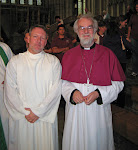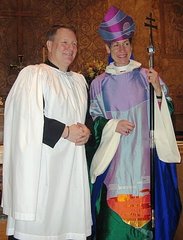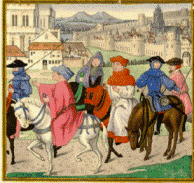Here's an interesting perspective on the history of the conflict between Christianity and homosexuality in Africa; excerpted from The New Republic by Episcope.
Unholy Communion
by Philip Jenkins
The New Republic
10.11.07 Issue date 10.08.07
In the past few years, conservative Episcopalians from a number of U.S. congregations have voted to bolt from their church and place themselves under various African leaders, including Nigeria's Anglican primate Peter Jasper Akinola. The source of the conservatives' discontent with the U.S. Episcopal Church was its liberal position on homosexuality. It had, after all, named an openly gay man bishop of New Hampshire. That was also the reason Akinola and other African clergy appealed to these largely white congregations. Akinola's church views any gay manifestation as an "acquired aberration" and has compared the U.S. Episcopal Church to a "cancerous lump." He has also backed legislation that prescribes severe prison sentences for gay sex....
Many African societies have well-established traditions of same-sex interactions and gay subcultures. In different parts of the continent, we can find everything from warrior cultures in which mature men sexually initiate youths, to examples of gender crossing. A decade ago, the varieties of African homosexuality were documented in the book Boy-Wives and Female-Husbands, edited by Will Roscoe and Stephen O. Murray.
Why, then, did opposition to gay rights become so critical for many African Christians? The answer has a lot to do with the rapid spread of Christianity on the continent in a relatively short time. In 1900, Africa had 10 million Christians, representing around 10 percent of the population. By 2000, that figure had grown to 360 million, or 46 percent. As a result, most African Christians today are first- or second- generation members of the faith, and many are adult converts. Sociologists generally agree that newer religious groups tend to have more literal approaches to scripture. In practice, of course, literalism still leaves plenty of room for debate and interpretation; but, when the Bible specifically condemns a particular sin--and same-sex interaction is repeatedly denounced in both the Old and New Testaments--that makes it difficult for literalists to find wiggle room.
In other ways, too, the rapid expansion of Christianity has conditioned African views on homosexuality. African churches exist in a ferociously competitive environment, one where traditional groups--like Anglicans and Catholics--must fight to maintain their market share against newer Pentecostal denominations, with their enticing promises of miracles and healings. The last thing the older churches need is a suggestion that their commitment to scriptural truth is anything less than absolute or that they are any less rigorous than their rivals in condemning sin.
The other key rival--and another factor shaping moral attitudes--is Islam. Over the past century, African Christianity has grown much more rapidly than Islam, a fact that puzzles and infuriates Muslims who regard the continent as naturally theirs. In 1900, for instance, Christians accounted for just 1 percent of the people of what would become the state of Nigeria; Muslims made up 26 percent. By 1970, however, the religions had achieved parity, each having around 45 percent of the population. And some recent polls suggest that, today, the nation has a Christian plurality. Against this background of rivalry and potential violence, Christians cannot be seen to concede anything to Muslims in terms of their commitment to strict morality. Even the harsh anti-gay measures that Akinola backs in Nigeria are still milder than the provisions enforced under the sha- ria code that prevails in one-third of the country's states, which includes the death penalty for homosexuality. Moreover, by condemning sexual liberalism, African churches are making clear to their own members and their Muslim neighbors that they are not puppets of the West. Moral conservatism thus serves to assert cultural independence--a link that requires sexual immorality to be portrayed as a Euro-American import. The Muslim context helps explain the sensitivity of gay issues in one other key respect. In the region later known as Uganda, Christianity first arrived in the 1870s, when the area was already under Muslim influence and a hunting ground for Arab slave-raiders. The king of Buganda had adopted Arab customs of pederasty, and he expected the young men of his court to submit to his demands. But a growing number of Christian courtiers and pages refused to participate, despite his threats, and an enraged king launched a persecution that resulted in hundreds of martyrdoms: On a single day, some 30 Bugandans were burned alive. Yet the area's churches flourished, and, eventually, the British expelled the Arab slavers. That foundation story remains well-known in the region, and it intertwines Christianity with resistance to tyranny and Muslim imperialism--both symbolized by sexual deviance. Reinforcing such memories are more recent experiences with Muslim tyrants, such as Idi Amin, whose victims included the head of his country's Anglican Church. For many Africans, then, sexual unorthodoxy has implications that are at once un-Christian, anti-national, and oppressive.
The Muslim context helps explain the sensitivity of gay issues in one other key respect. In the region later known as Uganda, Christianity first arrived in the 1870s, when the area was already under Muslim influence and a hunting ground for Arab slave-raiders. The king of Buganda had adopted Arab customs of pederasty, and he expected the young men of his court to submit to his demands. But a growing number of Christian courtiers and pages refused to participate, despite his threats, and an enraged king launched a persecution that resulted in hundreds of martyrdoms: On a single day, some 30 Bugandans were burned alive. Yet the area's churches flourished, and, eventually, the British expelled the Arab slavers. That foundation story remains well-known in the region, and it intertwines Christianity with resistance to tyranny and Muslim imperialism--both symbolized by sexual deviance. Reinforcing such memories are more recent experiences with Muslim tyrants, such as Idi Amin, whose victims included the head of his country's Anglican Church. For many Africans, then, sexual unorthodoxy has implications that are at once un-Christian, anti-national, and oppressive.
…
To be sure, Africa is a diverse continent, and some voices are more liberal on gay issues than others. Many of the most progressive can be found in South Africa, arguably one of the most gay-friendly countries in the world. Its constitution outlaws discrimination on grounds of sexual orientation, and, in 2006, the country legalized same-sex marriage. Many churches certainly opposed this latter measure, but the depth of feeling is nothing like what we find in a country like Nigeria. Anglican leader Desmond Tutu has spoken out for gay rights, declaring, "To penalize somebody for their sexual orientation is the same as what used to happen to black South Africans for something about which we could do nothing." Generally, bishops who do criticize homosexual behavior rank it low on their hierarchy of sins. The country's current Anglican primate, Njongonkulu Ndungane, calls homosexuality a "pastoral, secondary problem," and has rebuked Akinola for failing to address more pressing issues in his backyard.
One explanation for this phenomenon is that South Africa's unique history has given its leaders more room to promote tolerance on gay rights. After all, given the African National Congress's recent credentials in resisting white domination, the government can hardly be accused of passively succumbing to Western influence.
12 October 2007
The African war over homosexuality
Subscribe to:
Post Comments (Atom)







No comments:
Post a Comment